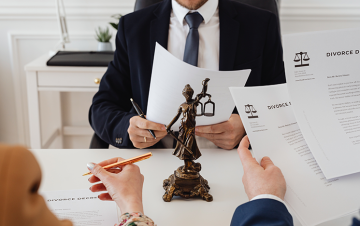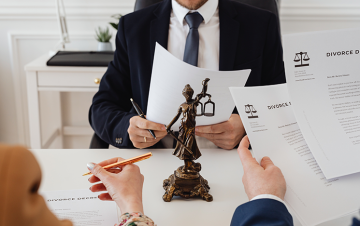Legalization of proceeds of crime: legal support
Money laundering, also known as "money laundering" or "legalisation of criminal proceeds", is a process by which illegally obtained funds or other valuables are made legal, i.e. "laundered". This process may involve a variety of actions aimed at concealing the origin of the proceeds of crime and making them appear legitimate.
Laundering of the proceeds of crime can take place through various channels, such as financial institutions, real estate, business enterprises, investments in valuables, etc. Criminals can use a variety of strategies to conceal the origin of their proceeds, including the creation of shell companies, the use of rollover transactions and other financial manipulation techniques.
The fight against money laundering is an important part of the fight against organised crime and the promotion of economic integrity. Many countries have adopted special laws and policies to prevent money laundering and investigate cases related to this type of financial crime.
Laundering of the proceeds of crime has serious consequences for society, as it can contribute to the growth of organised crime, disrupt economic stability and threaten national security. Therefore, this issue requires careful study and effective control measures.
Legal stages in laundering proceeds of crime
Resolving this legal issue requires a thorough and step-by-step approach:
- Consultation with the client: The lawyer meets with the client to discuss his/her problem or situation related to Article 209 of the CCU. During this consultation, the lawyer can gather important information and provide initial advice.
- Preliminary analysis of the legal situation: The lawyer conducts a preliminary analysis of the legal situation, examines the facts and applicable legal rules to assess the strengths and weaknesses of the case.
- Preparation of documents and choice of strategy: Based on the analysis, the lawyer prepares the necessary documents, such as pleadings, defence memoranda, contracts, etc. He also develops a strategy to solve the legal problem.
- Submission of documents and commencement of the process: The lawyer submits the necessary documents to the court on violation of Article 209 of the Criminal Code or other competent authorities and begins the process of resolving the case on behalf of the client.
- Representation in court or in negotiations: A lawyer represents his client's interests in court, in negotiations or in other legal procedures. Additional research and analysis: If necessary, a lawyer may conduct additional research and analysis of legal issues to support his or her client's case.
- Case resolution: The case may be resolved by agreement, court verdict or otherwise in accordance with the law.
- Appeal (if necessary): In case of disagreement with a court decision or other decisions, a lawyer can provide appeal services.
Each stage of legal assistance is an important step towards a successful outcome. Only a comprehensive approach, ranging from consultation with the client to possible appeals, can ensure the protection of the client's rights in full.
Under what conditions can a lawyer's service for legalizing criminal funds be provided?
The service can be provided in different situations, but it must meet certain criteria:
- A legal service under Article 209 of the CCU can be provided in various situations, but it must meet certain criteria. Here are some general conditions under which the service can be provided:
- Request for legal assistance: The client must contact a lawyer with a request for legal assistance or representation in a case.
- Legal competence: The lawyer must have the necessary qualifications and competence in the field of law relating to the client's particular problem. Conclusion of a service agreement: Usually, a legal services agreement is concluded between the client and the lawyer, which defines the scope, terms and remuneration for the services.
Without these components, legal assistance may be impossible, so it is important to consider these requirements at the initial stages.
Under what conditions can a lawyer's service for laundering criminal funds not be provided?

Conflict of interest: A lawyer may refuse to provide services if it may create a conflict of interest, for example, if he/she is already representing another party in a case that has interests opposite to the client's.

Client's insolvency: If the client is unable to pay the legal fees. Illegality: If the provision of services by a lawyer may be unlawful or contrary to the ethical standards of the Bar.

Improperty: If the provision of services by a lawyer may be unlawful or contrary to the ethical standards of the bar.
How to independently understand issues of legalizing illegal funds?
Independent analysis can be difficult, but some steps can help to better understand the situation and solve the problem:
- Research information: Start by researching information about laundering issue. You can use the Internet, the library, legal guides or other sources to get a general idea of your problem and possible solutions.
- Analysis of the legislation: Try to find the relevant legislation or regulations that apply to your situation. Read them carefully to understand your rights and obligations.
- Consult with experts: If possible, contact a legal professional who can provide you with advice. This may be an attorney, lawyer or other professional, depending on your specific situation.
- Thinking about alternative options: After you have received information and advice, consider different alternatives to your problem. Think about the possible consequences of each option.
- Making a decision: After exploring all the options, choose the one that you think is most appropriate for your needs and circumstances.
It is important to remember that complex legal issues may require professional assistance. If you have any doubts or problems understanding the legal situation, it is best to seek the assistance of a qualified lawyer or other legal advisor.
Common questions about money laundering
Question
What is income legalisation?
Answer
Money laundering is the process by which illegally obtained funds or other valuables are made legal, i.e. "laundered".
Question
What is Article 209 of the Criminal Code of Ukraine about?
Answer
Article 209 of the Criminal Code of Ukraine concerns the legalisation (laundering) of the proceeds of crime.
Question
What is Article 209-1 of the CCU about?
Answer
Article 209-1 of the Criminal Code of Ukraine defines liability for legalisation (laundering) of the proceeds of crime as a particularly serious crime.
What does the cost of a lawyer's services under Article 209 of the CCU depend on?
The price may depend on several factors. One of the main ones is the complexity and scope of the case, since such cases often include the study of financial documents, establishing links between illegally obtained funds and their subsequent legalization. It is also worth considering the level of experience and qualifications of the lawyer, since defense in such cases requires specialized knowledge in financial law and criminal law. Other factors affecting the cost include the timing of the case, the complexity of the evidentiary process, and the need to participate in many court sessions.
ConclusionProviding legal assistance in a case related to a violation of Article 209 of the Civil Code requires a clear sequence of stages and professionalism. Having gone through a consultation, situation analysis, preparation of documents, legal proceedings, and a possible appeal, the client has a chance to successfully resolve the issue. However, it is important to remember that a correct understanding of the situation, studying the legislation, and receiving qualified assistance significantly increase the likelihood of a positive outcome.




































